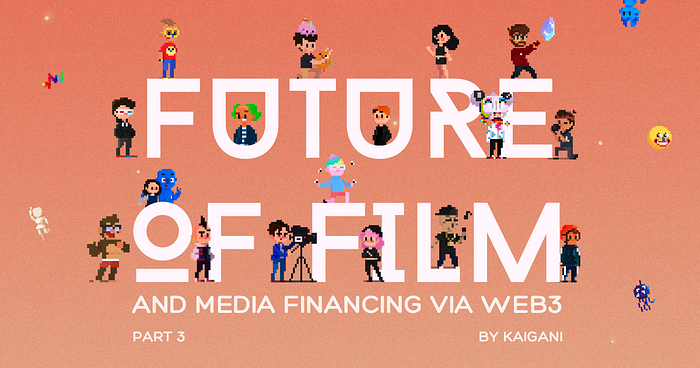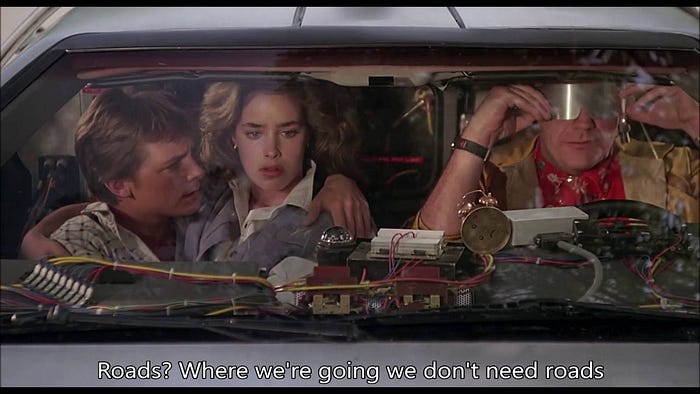
The Future of Film & Media Financing via Web3 — Part 3

Part 1 • Part 2
It started with a simple idea as Dan Sickles and I were brainstorming for the financing of our documentary film in development, I’m New Here. The film chronicles the key artists and innovators in the the web3/NFT space, so it made sense that the film too should be owned and funded by the community whose story we’re telling.
The ‘simple idea’ was as follows:
- Tokenize the film as an NFT
- Fractionalize the NFT for sale
- Sell the film, triggering a buyout of the fractionalized token, enabling profit-participation for the token holders who helped to bootstrap the funding of the film
A simple idea… followed by 6 months of meetings, legal fees, contract revisions and deal fatigue

We enlisted the help of dozens of people over that time to try to work through the detail of what became an increasingly complicated tangle of regulations and unknown territory at the intersection of web3 and the existing infrastructure around media financing and securities law.
I was on paternity leave through the thick of this, so special shoutouts to some of the folks who worked tirelessly on trying to figure this out: Carly, Jon, Bijan working with Dan, Hannah, Bruce and the rest of the DPop Studios production team. Also, the Republic team who were all ready to go with launching us on their platform.
However, when I returned from paternity leave and saw the team struggling to make this work, I eventually suggested we put a pin in this effort and rack it up to Discovery for what will be a much longer process — so that the team could keep making progress on the production of the film itself.
Before I get into our current thinking, let me summarize what we learned so far…
Lessons Learned — The First 6 Months
1. Get the right team together (mostly legal)
Dan & I brainstormed the idea, effectively as a creative filmmaker and a product innovator. We eventually had to gather lots of legal opinions (even just finding a legal team willing to operate in this unprecedented area was a challenge), work with folks who were familiar with putting together media deals, and people who were from the VC world and understood the complexities of selling equity. We decided to work with Republic, having settled on the Reg-CF crowdfunding provision as the legal route for selling equities to non-accredited investors.
Reg-CF allows for companies to sell up to $5M in equity to non-accredited investors through crowdfunding
There were no templates for pursuing doing this, merging equities with NFTs, so we underestimated how much time & effort would be spent on figuring out all the complexities involved in navigating the regulations.
2. Understand what is being tokenized
Our first concept, ‘Tokenize the film’, sounds great — but what does it actually mean? As we know from NFTs, it’s not the media which defines ownership, anyone can download a JPEG or an MP4 of the film, true ownership is defined by the legal rights associated with that media.
So when we attempt tokenize ownership of a film, there are a number of things we can be talking about, including:
- Commercial rights & licensing
- Distribution & streaming rights
- The film production company
It gets even more complicated when you consider that these rights can often be defined by territory. So what if someone wants to buy the EMEA distribution rights? How do you represent that as a token before those discussions & negotiations happen?
The essence of what we were aiming for was profit-participation, as an Executive Producer or equity investor in Hollywood would expect from a film they are helping to fund
To do this in the context of crowdfunding, however, we would need a vehicle for people to invest in, so the decision was made to spin up an LLC that would act as an investment holding company for all participants to buy equity in via Republic. (We needed a licensed broker to be able to issue equities under Reg-CF)
3. Track potential liabilities
There’s no such thing as a guaranteed return on investment, especially when backing a film. With private investment, this is generally understood and you would work through the specific details in the contract between the investor and the production company. With crowdfunding, we would have to draft blanket terms & conditions to cover the deal between the retail investors and the holding company — and how many people read terms & conditions online?
There’s always the potential that someone won’t make their expected ROI — and then who are they gonna sue?
The majority of the time we spent making sure that we were working within the bounds of the law, but that doesn’t mean we still wouldn’t get sued if the film underperformed. So who is actually liable if the holding company gets sued? This was a detail that was actually very hard for us to define, because no one wants to raise their hand to be liable in a class action lawsuit.
4. Don’t go it alone
The biggest lesson we learned through our ‘Discovery’ phase is how big and messy this problem is. We lack precedent, which means legal teams have to fly into unknown territory which is not what lawyers like to do.
Part of the inspiration to launch Lobby3 came from the realization that there needs to be active pressure on government bodies by advocates who represent the needs of the Web3 industry.
This is the change that is coming in the Media & Entertainment industry, but we need to organize together as a catalyst
There are many groups I’m talking to who are approaching the challenge of evolving the Media & Entertainment space to take advantage of the new innovations afforded to us by blockchain technology and NFTs — what’s starting to be referred to as Film3:
- NFT Film Squad
- Non-Fungible Films
- International Art Machine
- Uppercut Training Club
- Studio DAO
- Blockbuster DAO
and of course, we’re
From #Film3 to #Media3 — defining the future
We’re fundraising for our documentary film on the NFT space, I’m New Here, via a token sale.
For the time being, we’re doing this conventionally, without profit-participation.
However, I’m going to continue in the efforts, whether it is via a working group, industry organization or a DAO, to further develop a framework that will allow creators to reward their NFT holders with a share of their profits.
If we succeed in defining a legal framework, it could serve as an industry for NFT holders of future media projects to move beyond crowdfunding to profit participation — but there is a lot of work to do ahead.
We hope we’ve taken the first steps in paving the way for this long journey that will eventually redefine film & media financing across the industry!
As DPop Studios we’ll be launching other projects across the intersection of Web3 and the Media & Entertainment landscape — hence: #Media3
